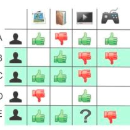Traditional recommender systems have heavily relied on identity representations (IDs) to model users and items, while the ascendancy of pre-trained language model (PLM) encoders has enriched the modeling of contextual item descriptions. However, PLMs, although effective in addressing few-shot, zero-shot, or unified modeling scenarios, often neglect the crucial collaborative filtering signal. This neglect gives rise to two pressing challenges: (1) Collaborative Contextualization, the seamless integration of collaborative signals with contextual representations. (2) the imperative to bridge the representation gap between ID-based representations and contextual representations while preserving their contextual semantics. In this paper, we propose CollabContext, a novel model that adeptly combines collaborative filtering signals with contextual representations and aligns these representations within the contextual space, preserving essential contextual semantics. Experimental results across three real-world datasets demonstrate substantial improvements. Leveraging collaborative contextualization, CollabContext can also be effectively applied to cold-start scenarios, achieving remarkable enhancements in recommendation performance. The code is available after the conference accepts the paper.
翻译:暂无翻译




